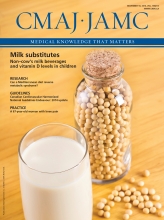Mediterranean diets and metabolic syndrome status in the PREDIMED randomized trial

Abstract
Background: Little evidence exists on the effect of an energy-unrestricted healthy diet on metabolic syndrome. We evaluated the long-term effect of Mediterranean diets ad libitum on the incidence or reversion of metabolic syndrome.
Methods: We performed a secondary analysis of the PREDIMED trial — a multicentre, randomized trial done between October 2003 and December 2010 that involved men and women (age 55–80 yr) at high risk for cardiovascular disease. Participants were randomly assigned to 1 of 3 dietary interventions: a Mediterranean diet supplemented with extra-virgin olive oil, a Mediterranean diet supplemented with nuts or advice on following a low-fat diet (the control group). The interventions did not include increased physical activity or weight loss as a goal. We analyzed available data from 5801 participants. We determined the effect of diet on incidence and reversion of metabolic syndrome using Cox regression analysis to calculate hazard ratios (HRs) and 95% confidence intervals (CIs).
Results: Over 4.8 years of follow-up, metabolic syndrome developed in 960 (50.0%) of the 1919 participants who did not have the condition at baseline. The risk of developing metabolic syndrome did not differ between participants assigned to the control diet and those assigned to either of the Mediterranean diets (control v. olive oil HR 1.10, 95% CI 0.94–1.30, p = 0.231; control v. nuts HR 1.08, 95% CI 0.92–1.27, p = 0.3). Reversion occurred in 958 (28.2%) of the 3392 participants who had metabolic syndrome at baseline. Compared with the control group, participants on either Mediterranean diet were more likely to undergo reversion (control v. olive oil HR 1.35, 95% CI 1.15–1.58, p < 0.001; control v. nuts HR 1.28, 95% CI 1.08–1.51, p < 0.001). Participants in the group receiving olive oil supplementation showed significant decreases in both central obesity and high fasting glucose (p = 0.02); participants in the group supplemented with nuts showed a significant decrease in central obesity.
Interpretation: A Mediterranean diet supplemented with either extra virgin olive oil or nuts is not associated with the onset of metabolic syndrome, but such diets are more likely to cause reversion of the condition. An energy-unrestricted Mediterranean diet may be useful in reducing the risks of central obesity and hyperglycemia in people at high risk of cardiovascular disease. Trial registration: ClinicalTrials.gov, no. ISRCTN35739639.
In this issue
Article tools
Jump to section
Related Articles
Cited By...
- How fragile are Mediterranean diet interventions? A research-on-research study of randomised controlled trials
- Incidence and regression of metabolic syndrome in a representative sample of the Spanish population: results of the cohort [email protected] study
- Association of dietary patterns and practices on metabolic syndrome in adults with central obesity attending a mission hospital in Kenya: a cross-sectional study
- Obesite centrale malgre un poids normal: Les dangers particuliers de la taille toxique
- Normal-weight central obesity: Unique hazard of the toxic waist
- Mediterranean diets and metabolic syndrome status in the PREDIMED randomized trial
- Trending Cardiovascular Nutrition Controversies
- Long-Term Immunomodulatory Effects of a Mediterranean Diet in Adults at High Risk of Cardiovascular Disease in the PREvencion con DIeta MEDiterranea (PREDIMED) Randomized Controlled Trial
- Frequent Consumption of Sugar- and Artificially Sweetened Beverages and Natural and Bottled Fruit Juices Is Associated with an Increased Risk of Metabolic Syndrome in a Mediterranean Population at High Cardiovascular Disease Risk
- Protective Effects of the Mediterranean Diet on Type 2 Diabetes and Metabolic Syndrome
- Mediterranean Diet, Retinopathy, Nephropathy, and Microvascular Diabetes Complications: A Post Hoc Analysis of a Randomized Trial
- Consumption of Yogurt, Low-Fat Milk, and Other Low-Fat Dairy Products Is Associated with Lower Risk of Metabolic Syndrome Incidence in an Elderly Mediterranean Population
- A journey into a Mediterranean diet and type 2 diabetes: a systematic review with meta-analyses
- MUFAs










